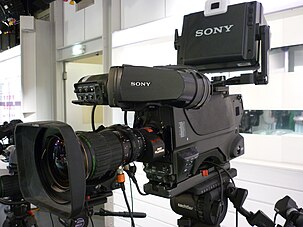This article needs additional citations for verification. (June 2012) |

A professional video camera (often called a television camera even though its use has spread beyond television) is a high-end device for creating electronic moving images (as opposed to a movie camera, that earlier recorded the images on film). Originally developed for use in television studios or with outside broadcast trucks, they are now also used for music videos, direct-to-video movies (see digital movie camera), corporate and educational videos, wedding videos, among other uses. Since the 2000s, most professional video cameras are digital (instead of analog).

The distinction between professional video cameras and movie cameras narrowed as HD digital video cameras with sensors the same size as 35mm movie cameras - plus dynamic range (exposure latitude) and color rendition approaching film quality - were introduced in the late 2010s. Nowadays, HDTV cameras designed for broadcast television, news, sports, events and other works such as reality TV are termed as professional video cameras. A digital movie camera is designed for movies or scripted television to record files that are then color corrected during post-production. The video signal from a professional video camera can be broadcast live, or is meant to be edited quickly with little or no color or exposure adjustments needed.